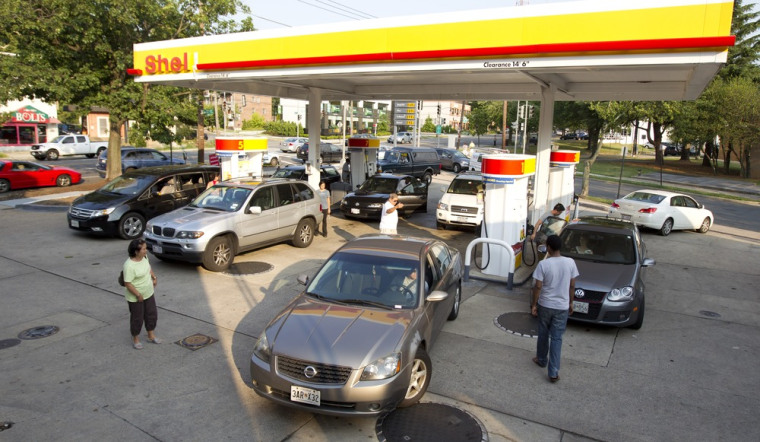It was nearly three years ago when then-presidential hopeful Newt Gingrich settled on his top campaign issue: the disgraced former House Speaker said he would push an energy policy that would lead to
$2.50 gas.
Indeed, in February 2012, the Georgia Republican said we'd already be paying $2.50 per gallon if it weren't for the Obama administration overseeing "an anti-American energy government." Gingrich added, "If you want $10 a gallon gasoline ... Barack Obama should be your candidate."
At the time, the average price for a gallon of gas was $4.25. Yesterday, despite Americans' outrageous willingness to reject Gingrich's candidacy and re-elect President Obama, it was
$2.77 -- and falling.
Several states, including Missouri, Oklahoma, and South Carolina, "could soon see sub- $2 gas, says Tom Kloza, senior analyst with the Oil Price Information Service."
Given that this is one of the year's biggest economic stories, it's worth appreciating what's going on here. As Brad Plumer
explained, the latest moves from the Organization of the Petroleum Exporting Countries (better known as OPEC) have played a big role.
OPEC -- a cartel of oil producers that includes Saudi Arabia, Iran, Iraq, and Venezuela -- had a big meeting in Vienna on November 27. Before the gathering, there was speculation that OPEC countries might cut back on their own oil production in order to prop up prices. But in the end, the cartel couldn't agree on how to respond and did nothing. Oil prices promptly nosedived, with the price of Brent crude now hovering around $70 per barrel.
As recently as the summer, that price was over $100 per barrel.
But the fact remains that prices were falling before OPEC's Friday announcement, driven in large part by Economics 101: less demand + higher supply = lower prices. In this case, economic slowdowns in much of the world have dampened demand, as supply has expanded considerably, especially within the U.S.
More generally, as Chris Mooney
noted, the Obama administration's improved fuel-efficiency standards also mean consumers are using less gas: "The sales-weighted fuel economy of vehicles in the U.S. increased from 20.8 miles per gallon in 2008 to 25.3 miles per gallon in 2014."
So, who wins and who loses from all of this?
The obvious beneficiary is the American consumer, who'll have some extra money in his/her pocket. That's also good for U.S. businesses, which will be able to sell some additional stuff to those with the additional cash.
Neil Irwin, meanwhile,
highlighted some of the "losers" of this story.
As the American economy has struggled to recover in the last few years, the exceptions have been oil-rich states like Texas and North Dakota, which have enjoyed low unemployment and strong real estate markets. But is the "Texas Economic Miracle" just an artifact of high energy prices and improving technologies to extract petroleum from the ground? Or is Texas' low-tax, low-regulation approach really the recipe for economic success? Seeing how the Texas economy fares now that prices are slumping will be a test. [...] [In addition,] Russia's economy is already facing its sharpest challenges in years, as Western sanctions imposed after Russian aggression toward Ukraine crimp the nation's ability to be integrated in the global economy. Russia is a major energy producer, and the falling price of oil compounds the challenge facing its president, Vladimir Putin.
Given Russia's already
precarious economic state, this is about the last thing Putin needed.
As for the Republican argument that Obama created higher gas prices on purpose --
a common GOP refrain in 2011 -- the right's arguments were foolish at the time. They look even worse now.
